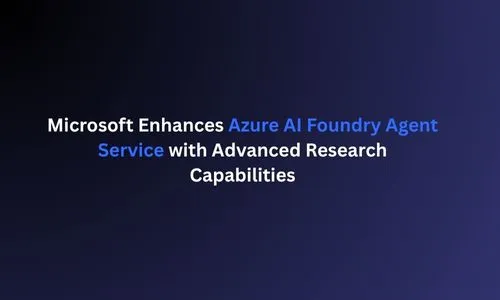Microsoft Enhances Azure AI Foundry Agent Service with Advanced Research Capabilities

Docker Desktop 4.42 Released with Native IPv6, Build-in MCP, & AI Model Packaging
July 12, 2025
Gemini Robotics On-Device: DeepMind’s AI Model for Robots
July 16, 2025Microsoft has taken a bold step forward in enterprise AI with the Azure AI Foundry Agent Service, a platform designed to empower businesses with cutting-edge tools for automation and intelligence. Recently, Microsoft announced the integration of advanced research capabilities, specifically the Deep Research feature, into this service, marking a significant leap in how organizations can harness AI for complex tasks. This blog explores the transformative potential of these enhancements, diving into how they streamline workflows, boost productivity, and redefine knowledge work for enterprises worldwide.
Automating Web Research at Enterprise Scale
The ability to conduct research efficiently is a cornerstone of modern business success. With the Azure AI Foundry Agent Service, Microsoft introduces tools that automate web-scale research, enabling organizations to process vast amounts of data quickly and accurately.
Streamlining Data Collection with AI
Traditional research methods often involve hours of manual data gathering, which can be time-consuming and prone to errors. The Azure AI Foundry Agent Service leverages advanced algorithms to automate data collection from diverse online sources. By integrating with Bing Search, it ensures that insights are traceable and backed by credible sources, reducing the risk of misinformation. This capability allows businesses to focus on analysis rather than data retrieval, saving valuable time and resources.
Scalability for Large Organizations
For enterprises with global operations, scalability is critical. The Azure AI Foundry Agent Service is built to handle large-scale research tasks, making it ideal for industries like finance, healthcare, and retail. Whether it’s analyzing market trends or monitoring regulatory changes, this platform provides a robust foundation for processing high volumes of data without compromising speed or accuracy.
AI Agents: Pioneering the Future of Knowledge Work
The evolution of AI has shifted from simple assistants to autonomous agents capable of performing complex tasks. Microsoft’s latest enhancements to the Azure AI Foundry Agent Service position it as a leader in this transformation, enabling businesses to redefine how knowledge work is conducted.
From Assistants to Autonomous Agents
Unlike traditional chatbots, AI agents in the Azure AI Foundry Agent Service are designed for autonomy. These agents can independently process unstructured data, make decisions, and execute tasks with minimal human intervention. For example, they can summarize reports, process invoices, or even draft content, freeing employees to focus on strategic initiatives. This shift from support to automation marks a new era in workplace efficiency.
Enhancing Productivity Across Industries
Organizations across sectors are already seeing the benefits of these AI agents. For instance, in healthcare, agents can streamline clinical workflows by extracting insights from medical records. In IT, they can automate support ticket management, reducing operational costs. By tailoring these agents to specific roles, the Azure AI Foundry Agent Service ensures that businesses can address industry-specific challenges with precision.
Deep Research: Unlocking Advanced Capabilities
The introduction of Deep Research in the Azure AI Foundry Agent Service is a game-changer for organizations seeking to tackle complex research tasks. This feature, now in public preview, empowers developers to build agents that plan, analyze, and synthesize information with unprecedented depth.
Grounded Insights with Bing Integration
Deep Research uses a best-in-class research model grounded in Bing Search to deliver accurate and verifiable results. Every insight generated is traceable, ensuring transparency and trust. This is particularly valuable for industries like legal and finance, where auditable outputs are essential for compliance and decision-making.
Composable Workflows for Seamless Integration
One of the standout features of Deep Research is its composability. Developers can integrate research agents into broader workflows using tools like Azure Logic Apps and Azure Functions. For example, a research agent can analyze market data, generate a report, and automatically email it to stakeholders—all within a single workflow. This flexibility makes the Azure AI Foundry Agent Service a powerful tool for digital transformation.
How It Works: Inside the Architecture and Agent Flow
Understanding the technical foundation of the Azure AI Foundry Agent Service is key to appreciating its capabilities. The platform’s architecture is designed to simplify the development and deployment of intelligent agents while ensuring security and scalability.
Building and Deploying Agents
To get started, developers create an Azure AI Foundry project within their Azure subscription. They can then deploy models like GPT-4o and equip agents with tools such as Bing, SharePoint, or Azure AI Search. These tools enable agents to access enterprise knowledge and perform real-world actions, such as generating reports or automating notifications. The platform’s SDKs and APIs make it easy to integrate agents into existing applications, ensuring a smooth transition from prototype to production.
Ensuring Trust and Safety
Microsoft places a strong emphasis on responsible AI. The Azure AI Foundry Agent Service includes enterprise-grade trust features, such as Microsoft Entra for identity management, role-based access control (RBAC), and data encryption. Additionally, the AI Red Teaming Agent proactively scans for vulnerabilities, ensuring that agents remain secure and compliant. Content filters and Prompt Shields further protect against malicious inputs, making the platform suitable for sensitive use cases.
Monitoring and Optimization
Once deployed, agents are continuously monitored to ensure reliability. The Azure Artificial Intelligence Foundry Agent Service integrates with Application Insights to provide full visibility into agent performance. Developers can track decisions, log outputs, and refine agents over time, ensuring consistent improvements in accuracy and efficiency.
FAQs
What is the Azure AI Foundry Agent Service?
The Azure AI Foundry Agent Service is a platform that enables businesses to build, deploy, and manage intelligent AI agents for automating complex tasks and workflows.
How does Deep Research enhance the Azure Artificial Intelligence Foundry Agent Service?
Deep Research adds advanced research capabilities, allowing agents to plan, analyze, and synthesize information from web sources, delivering traceable and auditable insights.
Can the Azure AI Foundry Agent Service integrate with existing tools?
Yes, it supports integration with tools like Azure Logic Apps, Azure Functions, and Azure AI Search, enabling seamless workflows across enterprise systems.
Is the Azure AI Foundry Agent Service secure?
Absolutely. It includes features like Microsoft Entra, RBAC, encryption, and AI Red Teaming to ensure security and compliance.
What industries can benefit from this service?
Industries such as healthcare, finance, retail, and IT can leverage the service for tasks like market analysis, clinical workflows, and support ticket automation.
How scalable is the Azure Artificial Intelligence Foundry Agent Service?
The platform is designed for enterprise-scale operations, capable of handling large volumes of data and complex workflows for global organizations.
Conclusion
Microsoft’s enhancements to the Azure Artificial Intelligence Foundry Agent Service mark a significant milestone in enterprise AI. By introducing Deep Research and advanced agent capabilities, the platform empowers businesses to automate complex research tasks, streamline workflows, and drive productivity. Its scalable architecture, robust security features, and seamless integration make it a versatile solution for organizations across industries.


